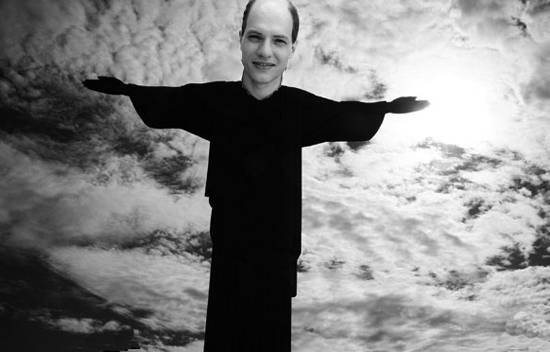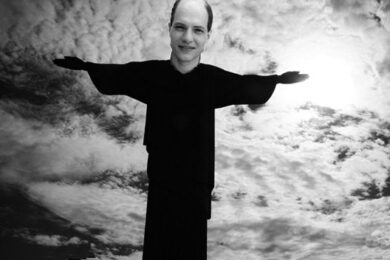It started with a tweet. I was rude about Alain de Botton. Not very rude, just a little. Moments later, I had an email from the man himself. The gist: "Siobhan, I’m sorry if I have upset you. Is there anything I can do about it?" After the initial shock that a public figure had searched the internet to find my email address, I spent the rest of the day laughing. What the hell was Alain de Botton doing emailing me? Customer service, it turns out. I guess it worked, because a few days later I was reading his new book Religion for Atheists (Hamish Hamilton, 2012).
It’s not the first time I’ve read a book about atheism. In 2007, I dutifully picked up The God Delusion (Transworld, 2006). "Ah," I thought, as I read Richard Dawkins’ polemic, "Yes, yes, you’re definitely right about that. Thank you Richard Dawkins, for telling me stuff I already knew but in a much more angry way." Growing up in Northern Ireland, I’ve been on the wrong side of religious persecution, so there’s not a lot I would disagree about in his criticism of religion. But you don’t need Richard Dawkins to tell you about outrages carried out in the name of religion, just open your eyes and look around the world.
Since the publication of The God Delusion, atheism, New Atheism, has been on the up. I’ve no idea if there are quantifiably more atheists, but they are much louder and much angrier. At the same time, atheism has collided with dogmatic scientific materialism and hooked up with liberal humanism. It seems impossible to be an atheist anymore without signing up to science-worship.
Sometimes, Dawkins really makes me squirm. Science has become the sole arbiter of truth. In science things are proven to be true or false, hypotheses can be tested and the truth can be decided. That’s not contentious. But are the only things of interest, the only things that constitute reality, 100% testable and knowable?
In The God Delusion Dawkins cites experiments carried out by Marc Hauser (Moral Minds). Hauser carried out tests in which he asked people a series of ever more complex "trolley" questions; a trolley is hurtling down a track towards five people. You are standing at the points: do you divert the trolley to save the people, killing a man trapped on the siding in the process? Dawkins and Hauser make much of the fact that atheists and believers all had similar responses. Hauser gets around the rather obvious criticism that even non-believers are en-cultured by religion, by citing research on the Kuna tribe in Central America which had the same results.
In 2010, Marc Hauser took a leave of absence from Harvard, after being held solely responsible for eight instances of scientific misconduct. Scientific misconduct explicitly excludes "honest error or difference of opinion". It has been defined by the US National Science Foundation as falsification, fabrication and plagiarism. Eight counts… that’s a lot. A year later Hauser was barred from teaching and eventually resigned.
What you don’t get from Dawkins is that when you scratch the surface of the scientific world there are people scrabbling for research funding; the quest for truth is often secondary to the politics and in-fighting; people are desperate to get their papers published in major journals. In extreme cases, results are fabricated. The fabricated paper in the Lancet claiming a link between the MMR and autism, for example, had dangerous consequences.
What’s that? "It’s people that do it, people who falsify data, who make shit up, it’s not science!" But science, doesn’t exist without people, it’s a bit like religion like that. And also like religion, when science claims something to be true, its followers uncritically believe it, whether they have access to the whole truth or not.
It’s not the only thing that science and religion have in common. A New Atheist would not like it if I suggested to them that the science they follow rests on unproven beliefs. It’s not an argument I tend to get into, because there’s not much difference in arguing with a New Atheist and arguing with a Christian about God. At the core of New Atheism is the dogmatic concept of immutable truth. This is the view of Biologist Rupert Sheldrake who, in the unfortunately titled The Science Delusion (Coronet, 2012), points out that "the belief system that governs scientific thinking is an act of faith, grounded in a nineteenth-century ideology".
Sheldrake is a pariah in the scientific community. His theory of morphic resonance and his research into the telepathy of dogs are frequently ridiculed. But whether you are convinced by his research or not, it’s hard to argue with the basic premise of his latest book – what he calls the "10 dogmas of science" need to be questioned. These include the view that everything is mechanical, that the laws of nature are fixed, and that all biological inheritance is from material. For Sheldrake, the scientific model that is synonymous with New Atheism is grounded in a materialist worldview. That materialism is an assumption, not a proven fact.
Let’s follow Sheldrake, who asks, "Are the laws of nature fixed?" We take it for granted that the laws of nature will be the same today as they were yesterday, and they will be tomorrow. It’s a perfectly rational assumption, based on inductive reasoning, that enables us to come up with lots of useful facts about the world. "Laws of Nature" implies something fixed, constant , but were these laws present before the Big Bang? Or was that the single, inexplicable miracle that created the Universe and created all of these fixed laws? Or if they already existed, where were they? And are these laws of nature the same all over the Universe, at all times?
The notion of fixity, of truth, at the heart of New Atheism, is itself derived from the Christian perception of the world. Sheldrake isn’t the first to point that one out. More than a hundred years ago Friedrich Nietzsche wrote the same thing. Nietzsche’s explanation for the emergence of religion as a mechanism for staving off nihilism (The Genealogy of Morality), which is infinitely more convincing and elegant than the one provided by Richard Dawkins, ends with a scathing attack on science and liberal ideals for having uncritically inherited a Platonic worldview from Christianity. In Platonism, there is a fixed, ideal world of transcendental forms, the truth of which is knowable to the intellect. This is opposed to the deceptive fluctuations of the phenomenal world perceived via the senses. "Laws of nature" are not dissimilar to fixed transcendental forms. It’s not surprising really, given that our scientific forefathers were deeply religious men, that our conception of truth should be so very Christian. But as non-believers, atheists, shouldn’t we be questioning the fundamentals of what we have inherited?
It’s not the only fundamental concept that science has inherited from religion. John Gray, the author of Black Mass: How Religion Led the World into Crisis (Allen Lane: 2007), argues that that "progress" is a Christian belief adopted by science. Of course, knowledge does accumulate, in the sense that more is known about the world. But this notion of progression is extrapolated into politics and ethics. Just because we know more doesn’t mean that the world is improving, getting better, progressing. In fact, things that are sold to us as progress are often things getting progressively shitter. Faith in humanity moving inextricably towards the truth, to a society of enlightened, rational individuals, is about as Christian as you get, and is foundational to the church of New Atheism.
What’s new about New Atheism, in contrast to old atheism where you could just get along not believing and not really thinking about it, is that structurally it is so very like a church. An example: every Christmas a large group of people gathers together. They all agree with each other on the fundamentals. They sit for a few hours and they listen to people who have access to deep truths of the universe. These truths are passed on by the few, usually in a watered down, palatable form, to the many. All nod in agreement, then go home, their view of the world confirmed but made even more shiny and wondrous. They’ve had a lovely time at Nine Lessons and Carols for Godless People.
There’s something about this that makes me feel intensely uncomfortable. Lots of people hanging out, agreeing with each other, thinking everyone else is a silly… it all has an inescapable aura of smugness. What’s wrong with doing something that challenges your beliefs, rather than just confirming them?
Whose idea of fun involves Richard Dawkins, centre stage, papers clutched, pointing out how silly crystal healing is? He says, "It’s so sad to think about all that they’re missing. The real world, properly understood in the scientific way, is deeply beautiful and unfailingly interesting." Nail on head – the only proper way to understand the world is through science, and anyone who doesn’t see it that way should be pitied.
Science replaces God, with church-like institutions in place. A few people are at the top making decisions about truth – the public face of this in the UK is mostly men, with Dawkins and, until recently, Hitchens at the forefront; angry, white, wealthy, men. (What is it about this country? Why do we love angry waspish men so much? What is it about them that we can’t get enough of?) The truth that they decide is then passed on by comedians, the new preachers of scientific dogmatism.
Feature continues after image

Truth is passed on. And while the scientists at the top may know exactly what they are talking about the grassroots you-and-I atheists often take what they say as (for want of a better word) gospel.
What isn’t publicised by scientists that court the media is that scientific dogmatism sits on a set of core beliefs and unquestioned premises. Which kind of makes it a little bit like religion, right?
This marriage of atheism with dogmatic scientific materialism leads to a horribly instrumentalist worldview. Only science, which has already figured out the structures of reality, has any say over truth. Scientists become accountants, tallying up the facts for the rest of us. They decide what is true and what is false, what is important and unimportant, and the rest of us are spoon-fed the answers. Nietzsche is much more scathing than me: "I’m not impressed at all with such a fuss and chattering from agitators: these trumpeters of reality are bad musicians. One can hear well enough that their notes do not sound out of the depths."
It wouldn’t be a stretch to re-title and re-focus Dawkins’ book as The Poetry Delusion, a polemic against the tyranny of artistic truth. Poetry as a virus, metaphor only useful in terms of conveying facts: the blind watchmaker, the selfish gene.
You don’t need to be G.W.F. Hegel to catch the whiff of a dialectic in all this. Atheism, a description of unbelief, has turned into a complex belief that takes Science as its God. And in the process many of the worst aspects of religion, those hankerings that have lay dormant in secular people since the death of God, dogmatism, myopia, the need to be part of something greater than yourself, have become very much part of it. I used to be happy to say I was an atheist, now I feel guilty by association.
No longer welcome among atheists, I need to find a new mode of unbelief. Lucky I got that email from Alain de Botton! Religion for Atheists – maybe that’s for me. After all, some of my favourite things, from the paintings of El Greco to the music of Arvo Pärt, are deeply religious. I’ve never read a book by Alain De Botton before. You don’t need to know a whole lot about him to assume that he’s quite lame, but I’ve always been secretly afraid that I would agree with him.
I didn’t agree with him. No, not at all. I read Religion For Atheists – shouts of horror rang through the house as I smashed my Kindle against my head in frustration.
Religion For Atheists is a book of nightmares. Alain de Botton stands at the pick & mix of world religion, and the sweets he chooses are the worst. What can we learn from religion? Religious ceremonies often involve eating, so let’s create a seating-plan-as-self-help-restaurant where people are forced to have dinner alongside people they don’t know to, you know, make friends and learn about other cultures and stuff (HORROR!); religions have iconography so let’s have billboard advertising for secular values (CRINGE!); everyone likes a temple so why not create temples to humanity (GAH!)? By the time I had finished Religion For Atheists I was willing the wholesale destruction of the Earth.
In Alain de Botton’s world, all we need is a cuddle. It’s a world in which somewhere like this could conceivably exist:
Source: http://www.youtube.com/watch?v=o43gmAbMfXc
De Botton and Dawkins both share one assumption – that people are inherently nice. They find it strange that people just won’t ruddy well think like them, but are convinced that it’s possible for anyone to be as enlightened as they are.
People are awful creatures: we do terrible things to each other, and religion is one of our excuses. Dawkins is fond of citing Steven Weinburg who said that "Religion is an insult to human dignity. With or without it, you’d have good people doing good things and evil people doing bad things, but for good people to do bad things, it takes religion." Does he mean that the atrocities carried out in concentration camps, the Gulag or in Tibet, were only carried out by evil people? Weinburg would have been more accurate if he had placed religion with "belief". It’s dogmatic belief that leads to atrocities, whether it’s belief in religion, or racial superiority, or ideology, or perhaps even, one day, in the superiority of the rational few who know that there is no God.
In a backstage interview for the BBC4 recording of Lessons And Carols For Godless People, smiley-features-PROFESSOR-Brian-Cox said, "The march of rationality begins here, and sweeps across the green fields of Britain." I’ve long considered myself a rationalist, but this isn’t a march I’ll be joining. After all, it walks on a ground of unquestioned belief, underneath a cloud of smugness.
What happens at the end of this scientific long march? When science holds the keys to all truth will everything become subservient to it? Think about it: push this instrumentalist approach to the world to its logical conclusion.
I still think it’s possible to be an atheist and concede that many of the fundamentals are not figured out. You don’t need dark matter to know that the fact of our existence is mysterious. I don’t deny that science is a wonderful thing that should be celebrated. I get as excited as anyone else by discoveries at CERN. But that can’t be everything. Not only science, please. Isn’t there more to existence than science can discover? Isn’t truth a broader church than New Atheism would have us believe?



